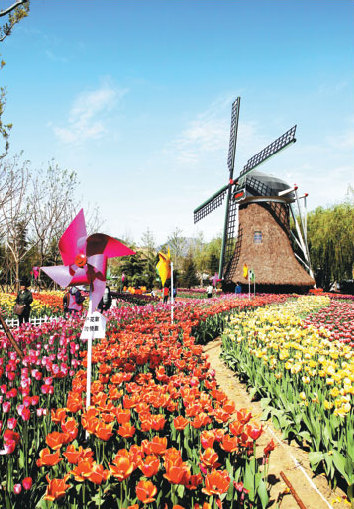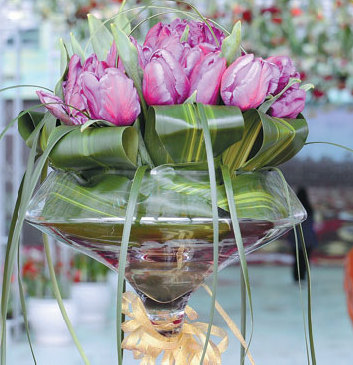Rare bloom a special gift
Updated: 2014-05-13 07:20
By Peng Yining and Xie Chuanjiao in Qingdao,Shandong (China Daily)
|
|||||||||||
When Jan-Karel Apeldoorn and his colleague found a new strain of tulip 10 years ago, the 35-year-old florist from the Netherlands said he never thought the flower would be presented as a national gift to Chinese President Xi Jinping and his wife Peng Liyuan during their visit in March.
With its special serrated edge, the purple tulip was named "Cathay" by the Dutch Queen Maxima and christened by Peng, who gave the flower a Chinese name "Guo Tai", which means prosperous country.
"I was there at the christening ceremony. It was a great honor seeing the Chinese president and his wife," Apeldoorn says. "Since this was their first trip to the Netherlands, it was also an honor for our country."
There was only one Cathay when it was first spotted among regular tulips, says Apeldoorn. "It was completely different and so beautiful, so we decided to keep it," he says.
The only bulb was carefully transplanted in a special field and harvested by hand, according to Apeldoorn. Usually it takes about five years to have a new strain by crossing different varieties but Cathay came naturally.
"The biggest challenge of growing Cathay is finding it in the first place," he says. "We are lucky it grew in our field but it wasn't pure luck. You have to have a good and professional eye to keep it and spend 10 years to cultivate it. Otherwise, you might throw it away."
Apeldoorn says tulips are a national symbol of the Netherlands and it has been a tradition to give tulips as a gift at international occasions.
"Cathay was picked because of its special shape and color," he says. "Our king and queen wanted to give a special gift rather than a regular tulip."
After Cathay's baptism, Apeldoorn received many phone calls from many other countries, including China, asking about the new tulip. "The baptism was a good promotion for Cathay," he says. "We started with one bulb and now we are ready to let more people to enjoy the beautiful flower."
Apeldoorn brought 500 Cathay to a flower competition at the ongoing International Horticultural Exposition 2014 Qingdao, Shandong province, which lasts until Oct 25. Featuring a model of a windmill, a sculpture of wooden shoes and tulip-shaped chairs, the Dutch garden is one of the foreign gardens in the expo site.
Tulip growing is more or less a Dutch business, according to Apeldoorn, and the Netherlands is the world's main producer of commercial tulip plants since the cold weather is good for the growth of bulbs.
His grandfather founded a flower company in 1928 and passed on it to his father. Now Apeldoorn is running the company with his brother and cousin.
"I have been going to the fields since I was 8 and started with picking flowers," he says. "After you get a little bit bigger, you get to work in the fields a little bit more."
Apeldoorn later went to college to study agriculture and directly went back to the family business after graduation. "My parents provided me an opportunity to work in this business, but they never said I have to take over," he says. "But it turns out I like this work."
Apeldoorn says the flower business allows him to travel around the world working with people from Japan, the United States and China. Customers from different places favor different varieties of tulip, he says. Chinese buyers' favorite is red tulips with yellow edges - the two colors of Chinese national flag.
"We have had business in China for five years. Now I come to China twice a year, before the Chinese New Year," he says. "The tulip has not been very popular in China, but I hope more people will soon appreciate its beauty."
Contact the writers at pengyining@chinadaily.com.cn
AT A GLANCE
"Cathay", the new strain of tulip christened by Peng Liyuan, wife of Chinese President Xi Jinping during their visit to the Netherlands in March, arrived in China on April 22, to highlight the 5th Beijing Tulip Festival, at the Beijing International Flower Port. This was the first time the Chinese public has been able to view the new tulip strain.
"The Cathay tulip has not yet entered the Chinese market," says Dutch florist Jan-Karel Apeldoorn. "But soon it will be available for customers in China."
Apeldoorn says they want to make Cathay an exclusive product, which means there will be a limited number of Cathay available and the price will be higher than regular tulips.
His company sells 25 kinds of tulip and has cultivated three new strains, including Cathay.
Apeldoorn says the Cathay has now become his favorite tulip and he has high expectations for this special flower, which was blessed and named by China's first lady.
Unlike Chinese roses and chrysanthemums, tulips are new in China, according to Jiang Yong, a florist based in Beijing and Apeldoorn's business partner. She hopes the christening will give more Chinese an education in tulips and tulip culture through Cathay, and present great business opportunities.
|
Jan-Karel Apeldoorn says he hopes to present the beauty of tulips to more Chinese people. Photos provided to China Daily |
|
The Dutch garden at the International Horticultural Exposition. |
|
The Cathay tulip is displayed during the 5th Beijing Tulip Festival. Wei Xiaohao / China Daily |
(China Daily 05/13/2014 page19)
Today's Top News
UN chief saddened by Turkey's mine tragedy
China-Russia gas deal to be inked
2 Chinese killed in Vietnam riots
Report adds steam to Abe's ambitions
China: US must be objective about Asia tensions
July elections in Thailand 'unlikely' amid crisis
274 dead in Turkey's worst-ever mine disaster
Russia to take on active role
Hot Topics
Lunar probe , China growth forecasts, Emission rules get tougher, China seen through 'colored lens', International board,
Editor's Picks

|

|

|

|

|

|








